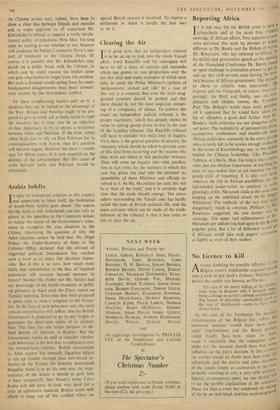Reporting Africa
TT is not easy for the British press to give sympathetic and at the same time truthful coverage of African affairs. Two separate attacks were delivered this week by persons aswicleTY different as Dr. Banda and the Bishop of Accra' Dr. Roseveare, who has returned to Ghana. In his skilful and provocative speech at the onemin! of the Nyasaland Conference Dr. Banda issue° all open challenge to journalists present la get UP and say that civil servants were leaving tory because of African government. The journa1s he chose to criticise were interesting: ttir Express and the Telegraph, of course; mare snr" prisingly, the Mail; and finally, spat out climactic and sibilant venom, the Post. The Bishop's words were more guarded, yet it appeared that he would have la-ken the list of offenders a good deal farther than the terri- Banda's. Such criticisms are not allegethefi.-4:11:11: out point. The multiplicity of personalities. Pl°ts' accusations, conferences and double-talk 140 African politicians constantly in the ne\Ns, .“'.t the news is rarely felt to be serious enough to disctISS in the terms of Kremlinology, say, or the strains behind the 'Chinese leadership. Like President Tubman of Liberia, Mao Tse-tung is also a poet - ruler, but the obvious importance of an3 thing he does or says makes him as yet unsuited far th: gosSip style of reporting. It is alSo very hat'''. whatever the risk to African sensibilities. for t.he fair-minded leader-writer to continue to k‘rtle glowingly of Dr. Nkrumah while at the same tinle keeping up the unbridled attack Oti 'Sir FAIgSt: Whitehead. The' methods of the two III ha, dangerously much in common. Perhaps, Dr.; Roseveare suggested, the real answer lies 11. coverage. The many real achievements of D,r" Nkrumah are seldom! touched upon-in. the Britisn. popular press. But a lot of bitternesS woula ifAfricans could take such papers' comments as lightly as most of their readers.






































 Previous page
Previous page